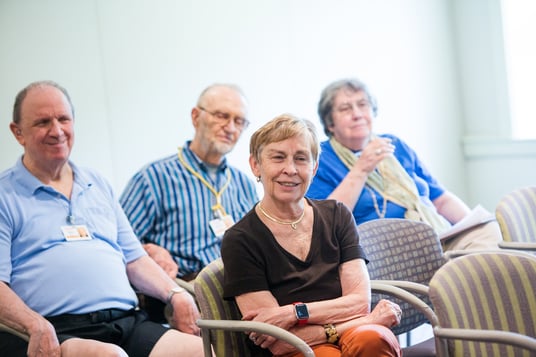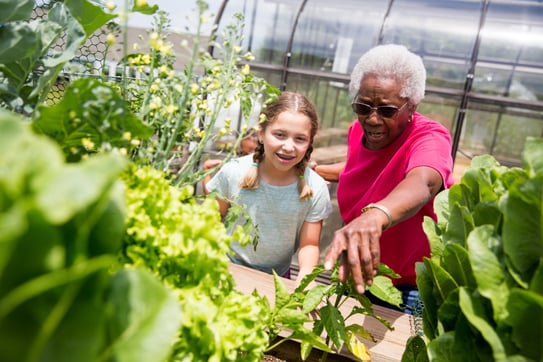Julia Child, Vera Wang, Toni Morrison, Ray Kroc.
What do the beloved chef, famed fashion designer, acclaimed novelist and founder of McDonald’s have in common? They all achieved success later in life, some well into their 50s and 60s, demonstrating that ageism (stereotyping, prejudice and discrimination based on age) is unfair and unfounded.
It is also holistically unhealthy, not only for older adults, but for all of society.
The Most Pervasive “Ism”
“Ageism doesn’t discriminate,” said 64-year-old Theresa Harrison, who later in life founded a cyber security company serving the U.S. Department of Defense.
“Don’t attempt to discard [older people],” she adds. “We’re so valuable. Invite us in to continue to grow with us. The world needs us.”
Indeed, we need our older citizens.
Even so, ageist ads, birthday cards, jokes and comments come across our radar (and sometimes out of our mouths) every day, unfiltered and unchecked. Anti-aging products and campaigns abound in our youth-obsessed culture – wrinkles and gray hair are to be avoided at all costs!
“Ageism is the last socially accepted form of discrimination,” according to HelpAge USA, an advocacy group for older people and their rights.
Consider this:
- A UN Global Report on Ageism found that half of the world’s population is ageist against older people.
- A 2018 survey of nearly 20,000 working adults aged 50+ found that 56% of them experienced at least one job loss due to age discrimination.
- In a large-scale, nationwide study of Americans aged 50-80, University of Oklahoma professor Julie Ober Allen found that a whopping 93% of respondents experience “everyday ageism,” those questions, assumptions, interactions and attitudes that suggest aging is undesirable. “We live in a culture that tells us from a young age how awful and tragic it is to get older,” she said.
Let’s explore some common misconceptions about older adults we may not even be aware we’re propagating.
Ageist Stereotypes and Language
Inaccurate typecasts of older people run the gamut:
- Older adults can’t learn technology or new skills.
- They are weak, frail and inactive.
- They are out of touch and can’t keep up with the times.
- They can’t remember anything.
- They are no longer sexually active.
- They are grumpy and depressed.
- They can’t see or hear well and shouldn’t be driving.
- All they do is play bingo and talk about their ailments.
- They are incapable, dependent and demented.
- They are a drain on the economy and healthcare system.
Ageist language is rampant too, with words that were once acceptable now being reframed in an attempt to change the way we think and talk about aging.
Terms such as elderly, senior citizens, aged, aging dependents, silver tsunami are being replaced by more neutral, person-focused phrases such as older adult, older person, persons over 65 (or the specific age of reference).
Still, even egregious slights such as geezer, coot, old fart and Grandpa or Granny (for someone who isn’t one’s grandparent) make their way into our lexicon without regard for the damage such words can inflict.
The Negative Effects of Ageism on Everyone
An attitude of ageism is often behind human rights violations such as elder abuse and financial exploitation. Age discrimination also imposes some very real physical, emotional and cognitive health consequences upon older adults, as they tend to believe damaging stereotypes about themselves.
Widespread negative attitudes toward older individuals contribute to higher mortality risks, slower recovery from illness, poor mechanical and mental health and compromised memory function. What’s more, ageism among health care workers can result in discriminatory practices that diminish quality and frequency of care.
Ageist stereotypes have also been linked to chronic stress for older adults, a threat to all bodily systems. At the institutional level, ageism can hinder the establishment of health policies beneficial to older individuals.
The stripping of human dignity based on age diminishes older adults’ numerous contributions to their families, communities and associations, thus negatively affecting all age groups. Robbing an older adult of their status as an esteemed, meaningful member of society robs us all.
The Value of Older Adults
Historically, in some cultures, older people were particularly revered. While such veneration has faded in modern times, anyone who has ever spent quality time with a grandparent, older neighbor or friend knows that person’s uniquely enriching benefit in their lives.
Here are just some of the contributions of older people to all of society:
 They are avid volunteers. A study from the Corporation for National and Community Service found that one in three volunteers is above the age of 55, and 72% of informal favors and acts of service are provided by older people.
They are avid volunteers. A study from the Corporation for National and Community Service found that one in three volunteers is above the age of 55, and 72% of informal favors and acts of service are provided by older people.- They are conscientious, capable caregivers. Many younger people rely on their parents or grandparents to babysit or provide daycare for their children, while several older adults are the full-time caregiver of a spouse or other family member.
- They are a font of wisdom and experience. Equipped with decades of knowledge and perspective, older people are ideal mentors and advisors with time and willingness to share what they’ve learned.
- As the fastest growing population in the U.S., older persons are major contributors to the economy, purchasing products and services and paying taxes. They also make more charitable donations than other age groups.
- They are active members of the work force. The number of workers aged 60+ doubled from 2000-2020.
- They have a healthier, happier perspective on life. Older people are often more forgiving, more patient and less self-centered than their younger counterparts. Several studies have shown that instead of waning, emotional health actually improves with age; depression, anxiety, anger, stress and worry decrease as time reveals what is truly important in life.
Join the Fight Against Ageism
Currently, several national and global efforts are striving to reframe the narrative around aging and cultivate a world that respects and accommodates older adults. Such movements aim to change not only attitudes, but also laws, policies and institutions that perpetuate ageism.
This is great news, but we as individuals can do our part, too.
Starting with an awareness of the existence of ageism, we can educate ourselves further on its harmful effects across all age groups, examine our own stereotypical attitudes and language and begin to eliminate them from our thoughts and speech, start constructive conversations about the problem of ageism, and celebrate the contributions of older people to all of society.
One visit to Collington is proof positive that older adults are leading active, involved, influential lives each and every day.
Contact us to learn more about our vibrant community today.





